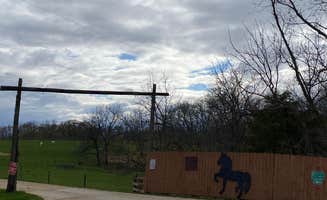Franklin Creek State Natural Area offers 882 acres of equestrian-friendly terrain northwest of Rochelle, Illinois. The region features a blend of hardwood forests, prairie lands, and natural springs with elevation changes that create variable trail conditions. During summer months, temperatures typically range from 75-85°F with humidity levels reaching 70-80%, making early morning rides most comfortable for horses and riders.
What to do
Trail riding on 12+ miles of paths: At Franklin Creek State Natural Area Equestrian Campground, riders can explore diverse terrain. "The equestrian trails offer more than 12 miles of horse hoofing fun and the terrain is heavily forested with just slight variable grades increasing and decreasing around fairly easy-to-maneuver turns," notes Stuart K.
Fishing in nearby waters: Several campgrounds near Rochelle offer fishing opportunities. At Morrison-Rockwood State Park, campers enjoy "a beautiful lake and cute restaurant/gift shop" according to Stephanie S. The park's lake is stocked with fish and offers boat rentals.
Bird watching in prairie environments: The open spaces at Big Rock Campground provide excellent bird watching. Amanda K. mentions seeing "Duck viewing" and "wildflowers" while camping here. The combination of grasslands and wooded areas attracts diverse bird species.
Visiting historic sites: Equestrian campers can ride to nearby historical attractions. The grist mill at Franklin Creek operates on weekends and serves as a destination point for riders exploring the trail system. As Stuart K. notes, "This place has a really nice connection with history as it features a fully functioning grist mill that goes all the way back to early Americana."
What campers like
Private camping spaces: Many horse campgrounds near Rochelle feature well-spaced sites. At Morrison-Rockwood State Park, Stacie H. found that "Most of the camp sites are fairly secluded from one another by distance and from surrounding foliage." This privacy is particularly valued by equestrian campers who need extra space.
Clean facilities: Despite their primitive nature, some campgrounds maintain excellent standards. Stacie H. emphasized Morrison-Rockwood has "the CLEANEST campground bathrooms I've ever seen! I'm not squeamish and have been camping for years so my expectations for campground bathroom cleanliness is well calibrated but these bathrooms (even the vault toilets!) were amazingly clean!"
Direct trail access: Equestrian sites typically offer immediate trail connections. At Seward Bluffs Forest Preserve, Jeff C. describes it as a "Hidden gem of Winnebago County. Beautiful, quite and clean park with hiking trails and horse trails." This direct access eliminates the need to trailer horses between camp and trails.
Affordability: Equestrian camping sites often provide good value. Penny R. says Seward Bluffs offers "Electric sites available with dump stations" at reasonable rates, though non-county residents pay higher fees. Most equestrian campgrounds in the area charge between $8-$31 per night depending on residency status and amenities.
What you should know
Reservation systems vary: Some equestrian campgrounds require advance booking while others operate first-come, first-served. At Hennepin Canal Lock 21 Campground, Stuart K. notes "You can't actually make a reservation here (or at any of the campgrounds along the Hennepin Canal for that matter) as this spot and the 5 others that make up the Hennepin Canal Lock camping options are only offered on a first-come, first-served basis."
Limited amenities: Most horse campgrounds prioritize space over conveniences. Art S. describes Hennepin Canal as having "picnic tables, vault toilets and water. The campsites are all on grassy areas with trees at the edges. This gives you some shade depending on the time of day."
Seasonal water availability: Water access can be limited during certain times. At Rock Cut State Park, Deb M. mentions that "The beach area is closed, so no swimming is available," which affects both horses and humans seeking cooling options.
Variable cell service: Connectivity issues are common at rural campgrounds. Deb M. reports that "our cell service (AT&T) was very spotty throughout the park" at Rock Cut State Park, while other carriers may perform differently.
Tips for camping with families
Playground accessibility: Some campgrounds feature dedicated play areas. At Paul Wolff Campground, Marisa A. observed "It is a super clean campground with multiple hosts and forest preserve staff. There are a large number of RV pads overlooking the prairie and a few along a grove of trees."
Wildlife viewing opportunities: Children often enjoy spotting animals. At Hansen's Hideaway Ranch, Stuart K. mentions the campground is "comprised of 100 or so acres of rich farmland and pastures where you'll see a good swath of horse roaming freely," creating natural encounters for kids.
Stream exploration: Water features provide entertainment for children. Franklin Creek has "a very nice stream here that the kids will love jumping across and/or wading in searching for crawdads or small fish," according to Stuart K.
Educational experiences: Historical sites offer learning opportunities. The working grist mill at Franklin Creek provides demonstrations that connect children with early American industry and agricultural practices.
Tips from RVers
Water hookup planning: At many equestrian campgrounds, utilities are positioned for convenience. At Big Rock Campground, Amanda K. warns "Water hookup is far behind camping pad - bring extensions!" This is particularly important for RVers with horses who need water access for both vehicle and animals.
Electrical considerations: Older campgrounds may have electrical limitations. Rebecca C. cautions about Rock Cut State Park: "The 30 amp plug there would work for about 2 mins and then would keep tripping again. So we ended up having to go back to camping world to get an adapter to use the 50 amp."
Parking configurations: Horse trailers require specific site layouts. At Franklin Creek, the campground features "horse trailer parking with easy access to the equestrian trails," positioning vehicles for efficient loading and unloading.
Maneuverability: Access roads vary significantly between campgrounds. Jeff and Linda L. note about Hennepin Canal Lock 21: "We saw a class A, so they do fit," confirming access for larger rigs despite the primitive setting.


